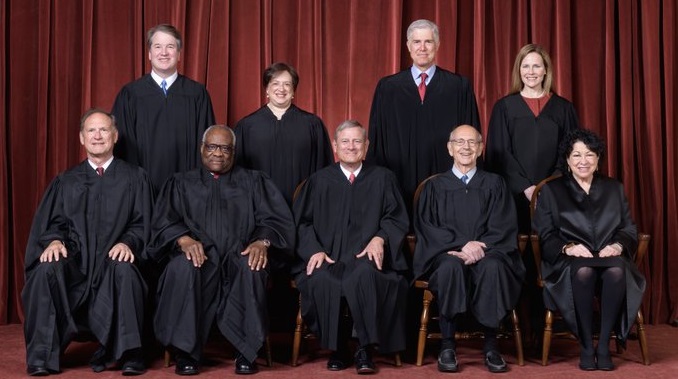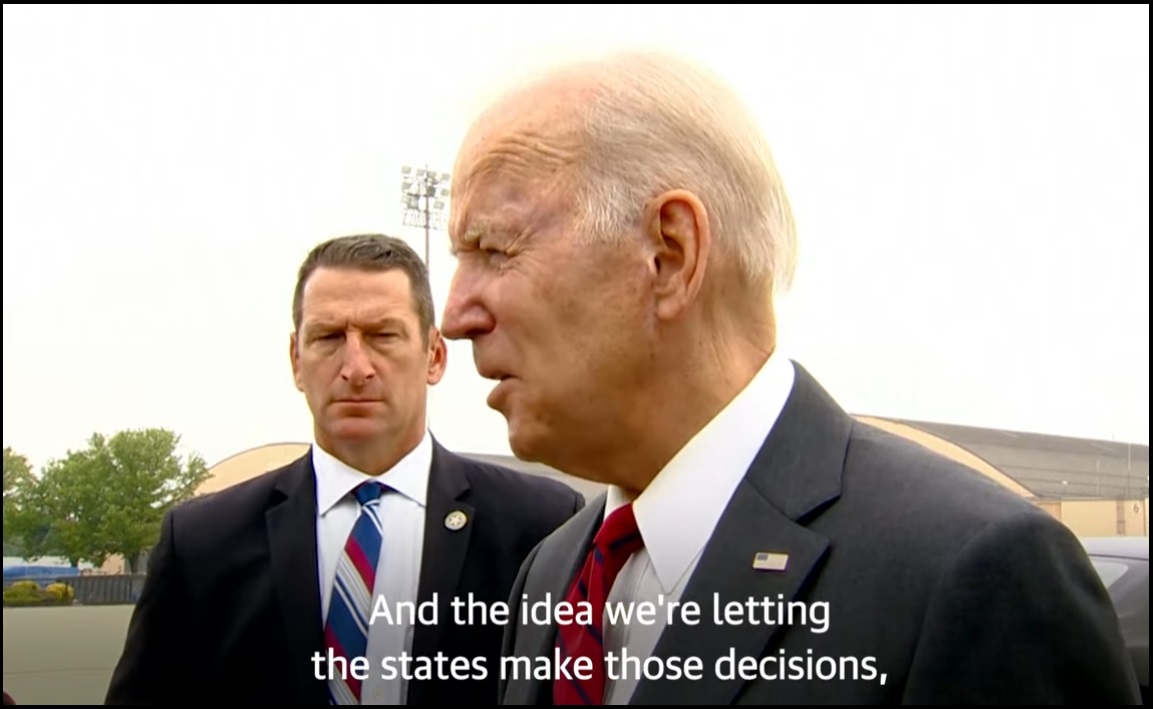SCOTUS Statement on Leak Investigation and Biden Statement on... Something
Today the U.S. Supreme Court issued the following statement:
 Supreme Court – “Yesterday, a news organization published a copy of a draft opinion in a pending case. Justices circulate draft opinions internally as a routine and essential part of the Court’s confidential deliberative work. Although the document described in yesterday’s reports is authentic, it does not represent a decision by the Court or the final position of any member on the issues in the case.
Supreme Court – “Yesterday, a news organization published a copy of a draft opinion in a pending case. Justices circulate draft opinions internally as a routine and essential part of the Court’s confidential deliberative work. Although the document described in yesterday’s reports is authentic, it does not represent a decision by the Court or the final position of any member on the issues in the case.
Chief Justice John G. Roberts, Jr., provided the following statement:
“To the extent this betrayal of the confidences of the Court was intended to undermine the integrity of our operations, it will not succeed. The work of the Court will not be affected in any way.
We at the Court are blessed to have a workforce – permanent employees and law clerks alike – intensely loyal to the institution and dedicated to the rule of law. Court employees have an exemplary and important tradition of respecting the confidentiality of the judicial process and upholding the trust of the Court. This was a singular and egregious breach of that trust that is an affront to the Court and the community of public servants who work here.
I have directed the Marshal of the Court to launch an investigation into the source of the leak.” (LINK)
🜋
[Transcript] – Q What do you think of the ruling — or the draft that leaked, sir?
THE PRESIDENT: “Well, first of all, I just got a call saying that it’s been announced that it is a real draft, but it doesn’t represent who’s going to vote for it yet. I hope there are not enough votes for it.
It’s the main reason why I worked so hard to keep Robert Bork off the Court. It reflects his view almost — almost word — anyway.
Look, the idea that — it concerns me a great deal that we’re going to, after 50 years, decide a woman does not have a right to choose within the limits of the Supreme Court decision in Casey, number one.”
“But even more equally as profound is the rationale used. And it would mean that every other decision relating to the notion of privacy is thrown into question.
I realize this goes back a long way, but one of the debates I had with Robert Bork was whether — whether Griswold vs. Connecticut should stand as law.
The state of Connecticut said that the privacy of your bedroom — you — a husband and wife or a couple could not choose to use contraception; the use of contraception was a violation of the law.
If the rationale of the decision as released were to be sustained, a whole range of rights are in question — a whole range of rights. And the idea we’re letting the states make those decisions, localities make those decisions would be a fundamental shift in what we’ve done.
So, it goes far beyond — in my view, if it becomes a law and if what is written is what remains, it goes far beyond the concern of whether or not there is the right to choose. It goes to other basic rights: the right to marry, the right to determine a whole range of things. Because one of the issues that this Court — many of the members of the Court — a number of the members of the Court have not acknowledged is that there is a right to privacy in our Constitution.
I strongly believe there is. I think the decision in Griswold was correct overruling; I think the decision in Roe was correct, because there’s a right to privacy. There can be limitations on it, but it cannot be denied.
Q Do you think this leak has irreparably changed the Court?
THE PRESIDENT: Beg your pardon?
Q Do you think that this leak has irreparably changed the Court? We’ve never seen this happen before.
THE PRESIDENT: You know, if — if this decision holds, it’s really quite a radical decision.
And, again, the underlying premise — and, again, I’ve not had a chance to thoroughly go into the report — the decision. But it basically says all the decisions related to your private life — who you marry, whether or not you decide to conceive a child or not, whether or not you can have an abortion, a range of other decisions — whether or not — how you raise your child —
What does this do — and does this mean that in Florida they can decide they’re going to pass a law saying that same-sex marriage is not permissible, that it’s against the law in Florida?
And so, there’s a whole — it’s a fundamental shift in American jurisprudence if it were to hold.
Q Mr. President, should the Senate do away with the filibuster to codify Roe?
THE PRESIDENT: I’m not — I’m not prepared to make those judgments now about — but, you know, I think the codification of Roe makes a lot of sense.
Look, think what Roe says. Roe says what all basic mainstream religions have historically concluded — that the right — that the existence of a human life and being is a question. Is it at the moment of conception? Is it six months? Is it six weeks? Is it — is it quickening, like Aquinas argued?
I mean, so the idea that we’re going to make a judgment that is going to say that no one can make the judgment to choose to abort a child based on a decision by the Supreme Court, I think, goes way overboard.
Q What does this mean for the midterms? What does this mean for the Democrats’ argument in the midterms?
THE PRESIDENT: I haven’t thought that through yet.
Q Do changes need to be made to the Court in light of this, if this decision holds?
THE PRESIDENT: I beg your pardon?
Q Do changes need to be made to the Court in light of this, if this decision holds?
THE PRESIDENT: We have to choose — I mean, look, one of the reasons why I voted against a number of the members of the Court: They refuse to acknowledge that there’s a 9th Amendment. They refuse to acknowledge there’s a right to privacy.
I mean, there are so many fundamental rights that are affected by that. And I’m not allo- — I’m not prepared to leave that to the whims and the — and the — of the public at the moment in local areas.”
Thank you so much. (LINK)





Post a Comment